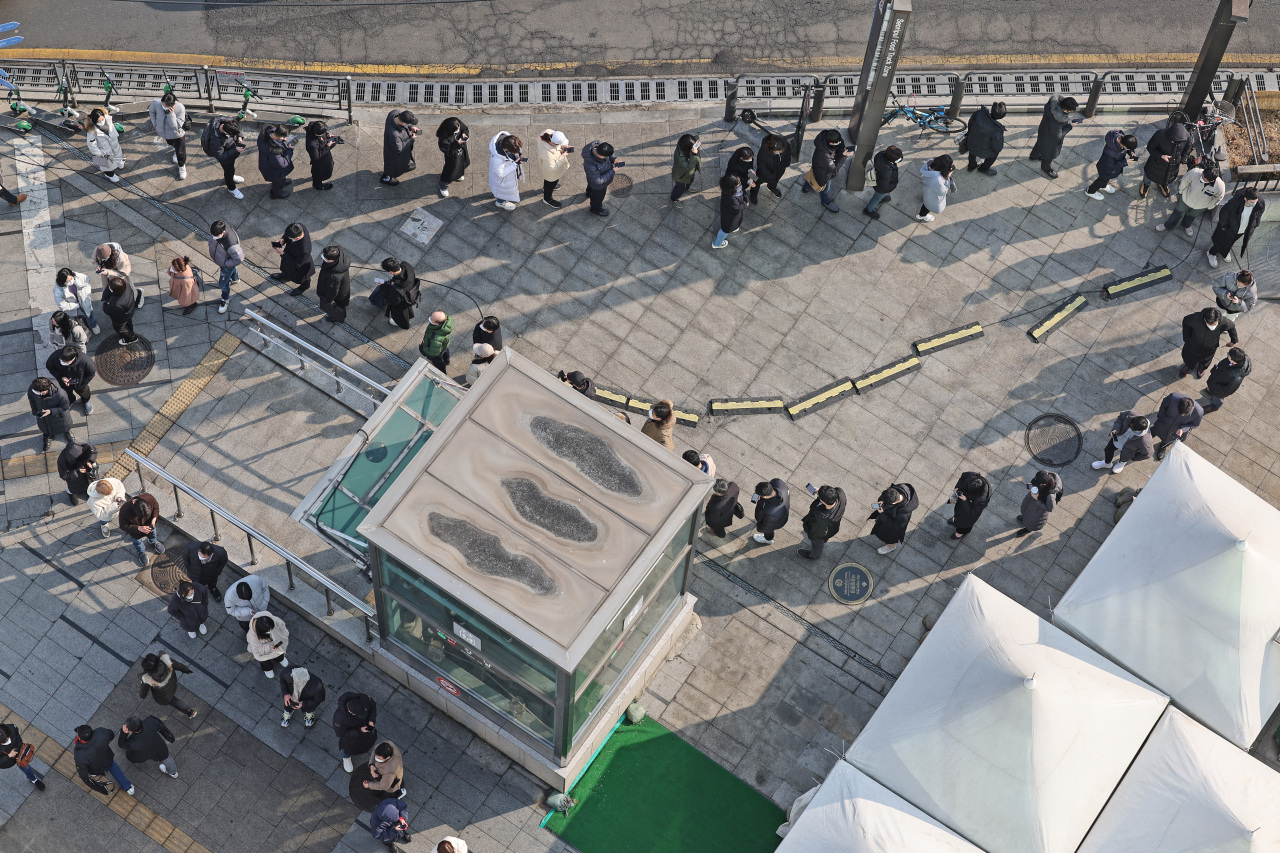S. Korea‘s daily COVID-19 cases surpass 13,000 amid omicron wave
By Shim Woo-hyunPublished : Jan. 26, 2022 - 16:08

South Korea’s daily COVID-19 cases topped 13,000 as of midnight Tuesday due to the rapid spread of the highly transmissible omicron variant. It was the first time that South Korea’s daily COVID-19 cases surpasses 10,000 in 737 days since the country saw its first confirmed COVID-19 case on January 20.
According to the Central Disaster and Safety Countermeasures Headquarters on Wednesday, the country added 13,012 COVID-19 cases, posting a dramatic increase from that of the previous day, when daily cases hit a record high of 8,571.
The recent increases in omicron cases, however, had no immediate impact on the number of critically ill patients and COVID-19 deaths, the government said.
As of midnight Tuesday, the number of critically ill COVID-19 patients stood at 385, down seven from the previous day. The country reported 32 deaths from COVID-19, slightly up from 23 on the previous day. The fatality rate reached at 0.87 percent.
According to the COVID-19 response headquarters, the number of critically ill patients and COVID-19 related deaths currently remain relatively low, largely due to increased vaccination rate among the people aged 60 years and older -- the age group that accounts for 90 percent of the total COVID-19 related deaths.
The government said 85.1 percent of the people aged 60 or over have received a booster shot, up from 22.1 percent reported on Dec. 8. The government added it will continue its efforts to administer booster shots to people age 60 and over to reduce the number of COVID-19 deaths.
The country also has enough hospital beds for critically ill patients, the government COVID-19 response headquarters noted. As of midnight Tuesday, 17.8 percent of hospital beds for critically ill patients were occupied, down from some 80 percent in early December.
The government, however, noted it should remain alert as the number of critically ill patients and COVID-19 deaths is likely to increase within two or three weeks, along with the omicron wave.
President Moon Jae-in on Wednesday also asked the government officials to speed up establishing a new virus response system to counter the spread of the omicron variant.
Under the new COVID-19 response system, more COVID-19 patients to be treated at home in a bid to keep asymptomatic transmission of COVID-19 low. It will increase supply of COVID-19 pills so that more patients can be quickly treated.
Local hospitals and clinics will administer also start to provide COVID-19 tests and treatments. The government plans to implement this measure nationwide starting on Feb. 3 after testing the scheme in four regions in the country, including Gwangju, South Jeolla Province and Pyeongtaek and Anseong in Gyeonggi Province.
The government will also have rapid antigen tests to replace polymerase chain reaction tests at testing sites, starting on Saturday. Moon asked the government officials to ensure a stable supply of rapid tests.
According to the Central Disaster and Safety Countermeasures Headquarters on Wednesday, the country added 13,012 COVID-19 cases, posting a dramatic increase from that of the previous day, when daily cases hit a record high of 8,571.
The recent increases in omicron cases, however, had no immediate impact on the number of critically ill patients and COVID-19 deaths, the government said.
As of midnight Tuesday, the number of critically ill COVID-19 patients stood at 385, down seven from the previous day. The country reported 32 deaths from COVID-19, slightly up from 23 on the previous day. The fatality rate reached at 0.87 percent.
According to the COVID-19 response headquarters, the number of critically ill patients and COVID-19 related deaths currently remain relatively low, largely due to increased vaccination rate among the people aged 60 years and older -- the age group that accounts for 90 percent of the total COVID-19 related deaths.
The government said 85.1 percent of the people aged 60 or over have received a booster shot, up from 22.1 percent reported on Dec. 8. The government added it will continue its efforts to administer booster shots to people age 60 and over to reduce the number of COVID-19 deaths.
The country also has enough hospital beds for critically ill patients, the government COVID-19 response headquarters noted. As of midnight Tuesday, 17.8 percent of hospital beds for critically ill patients were occupied, down from some 80 percent in early December.
The government, however, noted it should remain alert as the number of critically ill patients and COVID-19 deaths is likely to increase within two or three weeks, along with the omicron wave.
President Moon Jae-in on Wednesday also asked the government officials to speed up establishing a new virus response system to counter the spread of the omicron variant.
Under the new COVID-19 response system, more COVID-19 patients to be treated at home in a bid to keep asymptomatic transmission of COVID-19 low. It will increase supply of COVID-19 pills so that more patients can be quickly treated.
Local hospitals and clinics will administer also start to provide COVID-19 tests and treatments. The government plans to implement this measure nationwide starting on Feb. 3 after testing the scheme in four regions in the country, including Gwangju, South Jeolla Province and Pyeongtaek and Anseong in Gyeonggi Province.
The government will also have rapid antigen tests to replace polymerase chain reaction tests at testing sites, starting on Saturday. Moon asked the government officials to ensure a stable supply of rapid tests.




















![[Today’s K-pop] BTS pop-up event to come to Seoul](http://res.heraldm.com/phpwas/restmb_idxmake.php?idx=642&simg=/content/image/2024/04/17/20240417050734_0.jpg&u=)